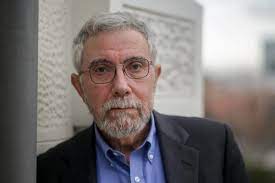Ep. 241 Krugman Confuses on Trade Surpluses

Bob uses a recent Krugman article to highlight how free-traders sometimes confuse the public on the nature of trade surpluses. Contrary to Krugman, there’s nothing foolish about exporting more than you import.
Mentioned in the Episode and Other Links of Interest:
- Bob’s mises.org critique of Krugman’s NYT column.
- Bob’s critique of the WSJ subtitle for a Barro op ed.
- Bob’s novel Minerva (pdf version compiled by a listener).
- Help support the Bob Murphy Show.
The audio production for this episode was provided by Podsworth Media.

I am not seeing how economic concepts like free-trade, comparative advantage and opportunity costs can be applied clearly to non-capitalist countries. Certainly not as clearly as they would in an ideal free market. Mercantile and classical economics don’t seem to have much purchase with regards to free-trade among non-free economies. MMT and the like have on the other hand built their entire analytical framework around centrally planned economies. And since much of the world is adopting more of the latter, this “modern” economics seems to unfortunately be becoming more relevant.
As an extreme example of this: consider socialist country A whose population significantly exceeds free market country B. The ruling party of country A forces their constiuents into slave labor to produce goods at artificially low cost for country B. Country A then might use the resulting accumulated trade surpluses to strategically influence and/or control aspects of the economy, government and other institutions of country B. Country A might establish monopolies of certain essential products. A cut-off of trade of these goods due to for example policy choices by either country might cause economic turmoil. Country B would not be able to rebuild its own supply easily due to the capital-intensive nature of such products. Is country A’s slave labor a comparative advantage over country B? Would country B be incurring an opportunity cost if it were to impose protections against country A in favor of say R&D to advance automated production of such goods? I don’t know of any direct or indirect claims that Austrian economics makes about comparative advantage or opportunity costs in the domain of non-voluntary transactions.
A less extreme example, and more related to the show: country X runs consistent trade deficits in its domestic currency. The point that “free-trade” economists might be making is that the accumulated currency of country X is a very different “good” than the goods and services that they were traded for. Particularly, the government of country X has much more control over the exported currency than anyone else has over the imported goods and services. For instance, inflation, financial repression or a foreign investment tax might be imposed. Domestically, country X would not go unscathed by such policies. But I bet if you were one of the policymakers or someone else who otherwise obtained inside information about said policies you would probably fare pretty well. Either way, one should be skeptical when economists like Krugman smugly declare that deficits don’t matter.